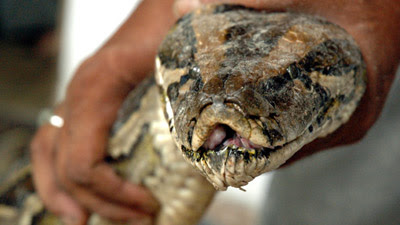
In October of 1998, the International Food Information Council published an article addressing food biotechnology and the environment. Their claim was that food production for the world's growing population takes its toll on the environment -an indisputable fact. Erosion of rich topsoil, pollution from farm chemicals, depletion of water supplies, adulteration of graze lands and deforestation all plague the natural world. They argue that these unfortunate aspects of modern agriculture could be completely eliminated, that the environment can be spared via... biotechnology (yeah, I thought they were going to say organic farming methods too).
So, the article goes on to list various reasons why biotechnology is a godsend for the environment. Some of these arguments are legitimate while others seem a little short-sighted. And then I came to section where they list how biotechnology and its use in agriculture and plant breeding has already been a huge success -and I couldn't help but laugh out loud. From the vantage point of 1998, American tree breeders had triumphed, producing, with the aid of genetic engineering, a Dutch elm tree immune to Dutch elm disease and an American Chestnut tree protected from chestnut blight! They tell how Brazilian eucalyptus plantations enjoyed a 112% yield increase since employing modern cloning techniques! And at this point I'm on the floor laughing 'till I cry (not literally, but I could have been).
So, yeah, two new breeds of Dutch elm were produced via cloning techniques, which was a major breakthrough, but has since not helped the forests of native American elm trees. The disease was brought to the US via exotic beetles carrying an exotic fungus that wreaked havoc on trees in Europe. It was introduced to elm plantations in America, where vast monocultures of elms were grown for lumber and were produced by means of root grafting, so that sap might be exchanged underground from one tree to another. In short, a disease was introduced into an artifical, homogeneous elm forest, in which every tree was attached to the other. Of course, it spread like wildfire, and of course the creation of a disease-resistant variety is a panacea for owners of tree plantations... but this did nothing for American elm trees in forests, and Dutch elm disease continues to be a threat today.
The creation of an American chestnut tree resistant to chestnut blight has a similar story. I don't deny that the existence of a resistant tree might still prove to be beneficial or even crucial to the tree's survival. Since 1998, however, the American Chestnut has been listed as an extinct species for all intents and purposes. Individuals still exist, but these trees will never make it to the stage of viable reproduction. The species is as good as dead today -despite the miracle of bioengineering 12 years ago.
The story about the eucalyptus plantation is true enough. Plantations in Brazil have flourished with the introduction of this high-yielding variety of tree... and the local environment is suffering for it. This past September, The Global Justice Ecology Project compared the eucalyptus in Brazil to the kudzu problem in the southern states of the US. They claimed that a South Carolina-based company had the "muddle-headed idea" to plant 330 acres of Australian eucalyptus genetically modified to withstand cold weather. They said that "[t]he idea is that the tree, native to Australia, could be used commercially to make paper and as fuel for power plants. The Summerville, S.C.-based ArborGen, says the hybrid it would use can't easily reproduce. People thought kudzu was a good idea, too."
The trees, aside from taking over space and crowding out native species, have robbed native wildlife of food and shelter resources, threatening Brazilian ecosystems. In addition, even when the eucalyptus is controlled, this genetically-engineered "supervariety" requires water like you wouldn't believe! True, output will increase, but substantial amounts of water are needed to support this output. Currently, one of the wettest places on earth -the Brazilian rainforest- is running out of water... But back in 1998, this marvel of biotechnology had saved the world!
Not all of the article's points were so very flawed. The benefits to the pharmaceutical indistry that the authors point out have proven to be very useful in today's medical world. Other arguments about the need to replace chemicals and fertilizers with GM plants and the impossibility of supporting a growing population without increasing yield per acre via bioengineering are still debatable and highly contested today. But these examples I've presented here, as well as others that I didn't mention, just go to show that, in some instances, only time will tell.



















